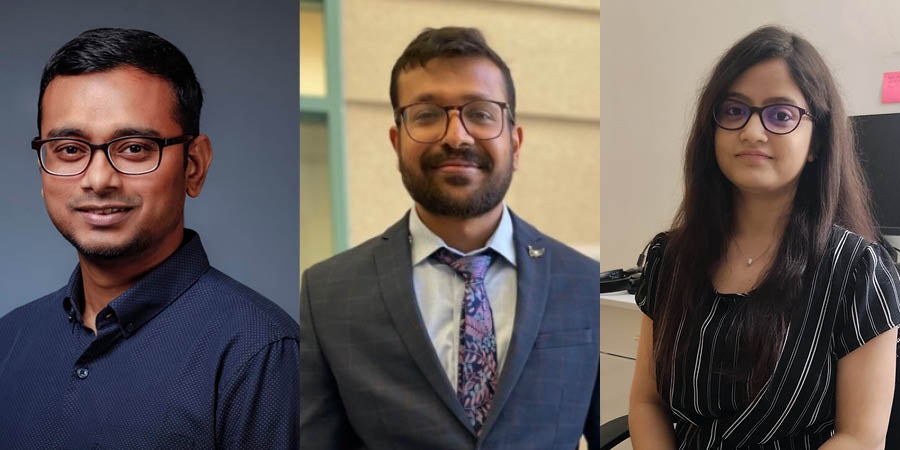PhD students show ingenuity at the 2022 Christopher Burke PhD Poster Competition

Three PhD candidates in the civil, materials, and environmental engineering (CME) at UIC were awarded for their research during the annual Christopher Burke and Susan S. Burke Civil Engineering Poster Competition.
Nahid Parvez Farazi won first place for the poster titled “Package Delivery Using eVTOL Aircraft with Community Noise Impact Considerations: Bi-objective Optimization Approach.”
“I am really happy and honored to be the recipient of this award. My sincere thanks to judges for selecting me for this award,” said Farazi, who works under the direction of Associate Professor Bo Zou in the Translog Lab at UIC.
Farazi is researching a new concept of advanced air mobility that envisions an extensive use of electric vertical takeoff and landing aircraft in the near future.
“The aircrafts have the potential to be used as a substitute for trucks, which will reduce negative impacts such as congestion, air pollution, road wear-and-tear, parking shortage, and more,” he said.
This research is funded by a NASA student grant.
Ritesh Jagatramka won second place for the poster “Chemistry Induced Heterogeneities in the Feformation Behavior of FCC Solid Solutions.”
“It was quite a journey and I felt rewarded because of the work I put into my research,” said Jagatramka, who is working under the direction of Assistant Professor Matthew Daly in the Advanced Materials and Microstructural Lab at UIC.
“I started off as a beginner in doing research, but over the year due to support and guidance offered by my supervisor I have developed my skill sets as a researcher.
The research provides a comprehensive framework – based on the Kinetic Monte Carlo approach – is developed to predict competition between deformation twinning and dislocation slip through the analysis of deformation morphologies and the generalized planar fault energy landscape.
Sindhusuta was named the third-place winner for the poster “Numerical Study on Phase Transformation Induced Material Fracture.”
The objective of his research is to develop a numerical model for the simulation of phase transformation-induced failure in geo-materials. The materials of interest include different groups of minerals found in the earth crust such as granulite, eclogite, and olivine.
“I was really glad to be in top three,” said Sindhusuta, who works under the supervision of Associate Professor Sheng-Wei Chi in the Computational Mechanics Lab.
“My supervisor has helped in my research in many ways. He created a very positive learning and knowledge-sharing environment in the lab, and encourages us to present research work at conferences, participate in competitions, and emphasizes the importance of sharing research and getting feedback from research community.”